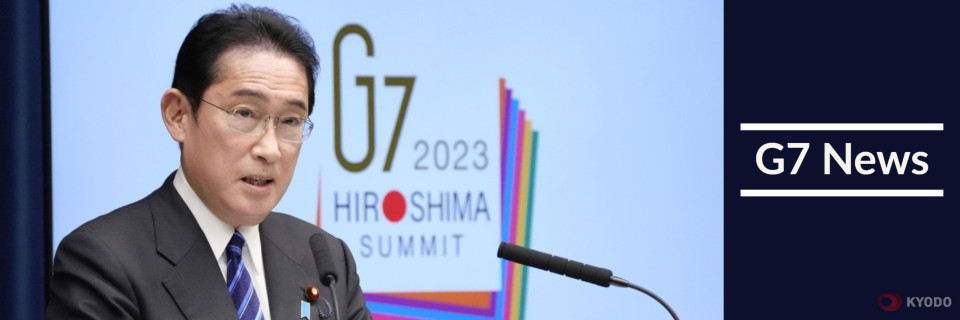The Group of Seven advanced nations on Sunday called for international standards to ensure the "responsible" use of artificial intelligence, as they seek to harness rapidly developing technologies like AI bot ChatGPT while mitigating privacy concerns and other risks.
With data a critical component in trade and AI development, the G-7 digital and technology ministers also agreed following their two-day meeting in eastern Japan to establish an international arrangement to enhance the free flow of trusted data across national borders.
The gathering took place as countries seek to keep up with the fast-moving pace of AI development, with ChatGPT, made by U.S. venture OpenAI, grabbing worldwide attention over the past few months with its ability to generate more natural and human-like text responses than previous AI tools.

While recognizing that approaches to achieve "the common vision and goal of trustworthy AI" may vary across G-7 members, the representatives from Japan, the United States and European nations said in their joint declaration released after their talks that they are resolved to "promote international technical standards" toward that end.
They expressed opposition to "the misuse and abuse of AI to undermine democratic values, suppress freedom of expression, and threaten the enjoyment of human rights," apparently reflecting concerns over countries such as China where high-tech mass surveillance are believed to be used against certain ethnic groups.

The joint statement also cited five principles for policymakers to govern the use of AI and other emerging technologies -- rule of law, due process, democracy, respect for human rights and harnessing opportunities for innovation.
"The G-7 should accelerate discussions on the potential of generative AI in a responsible manner," Japanese Internal Affairs and Communications Minister Takeaki Matsumoto told a joint press conference that was also attended by Digital Minister Taro Kono and others.
In an action plan on AI issues, which was adopted along with the declaration, the G-7 called for broader stakeholder participation in developing international standards over AI governance frameworks, and promoting dialogue on topics such as risk assessment.
While AI tools like ChatGPT, which has garnered 100 million users around the world in less than three months since its launch in November, could be highly beneficial, concerns have also been raised over their unauthorized collection of large amounts of personal data and potential misuse.
Chatbots have been known to produce outputs that are factually incorrect as well as perpetuate biases, while AI art generators like DALL-E 2, also by OpenAI, have been used to create deepfakes -- realistic depictions of fake scenarios that are another form of disinformation.
Countries have so far differed in their approaches on how to balance the use of the innovative technology and regulations, with Japan taking a more cautious approach in regulations than the United States and European nations.
To promote so-called Data Free Flow with Trust, a concept proposed by Japan, the G-7 ministers noted the need to "accelerate and operationalize" the idea, calling that data "an enabler of economic growth, development and social well-being."
The idea aims to enable the full potential of global economic growth without compromising the privacy and security of individuals and businesses.
Under the new institutional framework, the Japanese government aims to lay out a road map for future projects such as creating a base registry that businesses can use to reference other countries' data regulations.

The officials from Britain, Canada, France, Germany, Italy, Japan and the United States plus the European Union also adopted separate action plans for internet governance and enhancing resilient digital infrastructure in light of geopolitical risks.
The former seeks to collaborate in addressing internet shutdowns, network restrictions and violations of human rights using digital tools, as well as fake news and other forms of disinformation seen, for example, during Russia's invasion of Ukraine.
"We resolve to cooperate in making visible and tackling the tactics of digital authoritarianism" and "remain committed to protecting our democratic institutions and values from foreign threats," the statement said.
The G-7 also voiced commitment to constructing secure network infrastructure to support emerging and developing countries and promoting collaboration to improve the connectivity of undersea cables.
The weekend gathering in Takasaki, Gunma Prefecture, jointly chaired by Matsumoto, Kono, and Economy, Trade and Industry Minister Yasutoshi Nishimura, was one in a series of ministerial meetings taking place in the run-up to the G-7 summit next month.
India and Indonesia, this year's respective hosts of meetings of the Group of 20 major economies and the Association of Southeast Asian Nations, as well as Ukraine, also participated in the meeting in Takasaki.
Related coverage:
G-7 ministers agree on 5 principles to govern AI, emerging tech
Digital experts discuss responsible governance ahead of G-7 meeting
Cyberattacks increasing in Japan ahead of G-7 summit

 By Donican Lam,
By Donican Lam,









